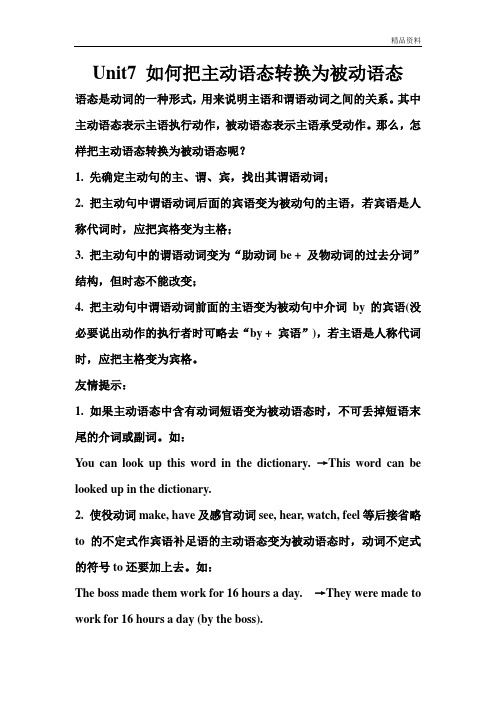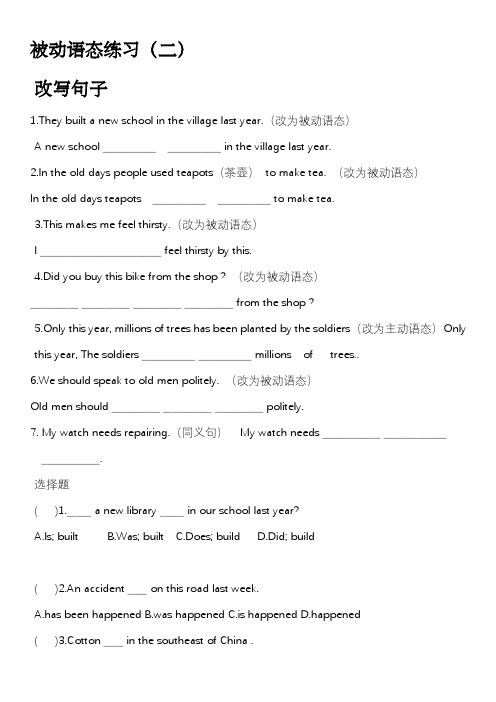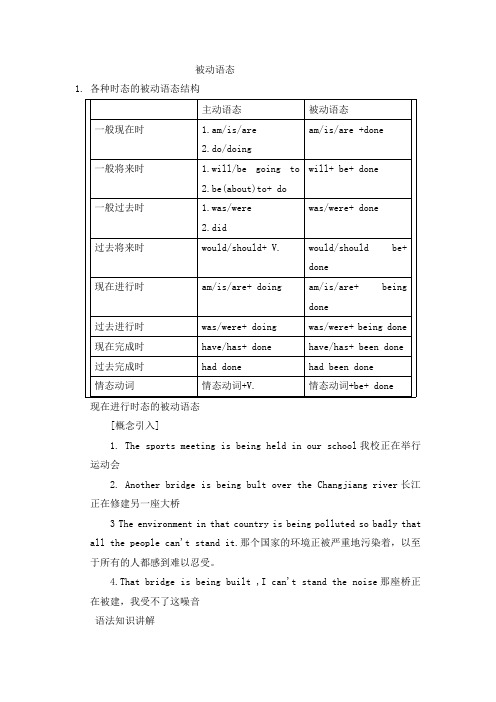冀教版初二被动语态
- 格式:doc
- 大小:16.50 KB
- 文档页数:2

Unit7 如何把主动语态转换为被动语态语态是动词的一种形式,用来说明主语和谓语动词之间的关系。
其中主动语态表示主语执行动作,被动语态表示主语承受动作。
那么,怎样把主动语态转换为被动语态呢?1. 先确定主动句的主、谓、宾,找出其谓语动词;2. 把主动句中谓语动词后面的宾语变为被动句的主语,若宾语是人称代词时,应把宾格变为主格;3. 把主动句中的谓语动词变为“助动词be + 及物动词的过去分词”结构,但时态不能改变;4. 把主动句中谓语动词前面的主语变为被动句中介词by的宾语(没必要说出动作的执行者时可略去“by + 宾语”),若主语是人称代词时,应把主格变为宾格。
友情提示:1. 如果主动语态中含有动词短语变为被动语态时,不可丢掉短语末尾的介词或副词。
如:You can look up this word in the dictionary. →This word can be looked up in the dictionary.2. 使役动词make, have及感官动词see, hear, watch, feel等后接省略to的不定式作宾语补足语的主动语态变为被动语态时,动词不定式的符号to还要加上去。
如:The boss made them work for 16 hours a day. →They were made to work for 16 hours a day (by the boss).We saw them work in that workshop. →They were seen to work (by us) in that workshop.3. 如果主动语态的句子中含有双宾语变为被动语态时,有两种方法:①将指人的间接宾语作被动语态的主语时,要将人称代词宾格变为人称代词主格,指物的直接宾语保留不变;②将指物的直接宾语变为被动语态的主语时,间接宾语保留不变,但要在其前加介词for或to。

冀教版英语八年级下册知识点总结英语八年级下册是学习英语的一个重要阶段,其中包含了许多重要的知识点。
下面是对八年级下册的知识点进行总结与归纳。
一、动词时态1. 一般现在时一般现在时表示经常性的动作、习惯性的动作或现在的状态。
句子结构为主语+动词原形。
2. 现在进行时现在进行时表示现在正在进行的动作,句子结构为主语+be动词+动词-ing。
3. 一般过去时一般过去时表示过去发生的动作或存在的状态,句子结构为主语+动词过去式。
4. 过去进行时过去进行时表示过去某个时间点正在进行的动作,句子结构为主语+was/were+动词-ing。
5. 现在完成时现在完成时表示过去发生的动作对现在造成的影响或结果,句子结构为主语+have/has+动词过去分词。
6. 过去完成时过去完成时表示过去某个时间点之前已经发生的动作,句子结构为主语+had+动词过去分词。
二、被动语态被动语态表示动作的接受者在句子中的位置比较靠前,句子结构为主语+be动词+动词过去分词。
三、条件句1. 第一类条件句第一类条件句表示与现在或将来的事实相反或不太可能发生的情况,句子结构为:if + 简单现在时,主句将来时。
2. 第二类条件句第二类条件句表示与现在或将来的事实相反或不太可能发生的情况,句子结构为:if + 过去式,主句将来时。
3. 第三类条件句第三类条件句表示与过去事实相反的情况,句子结构为:if + 过去完成时,主句将来完成时。
四、情态动词1. can/couldcan表示能力、许可或可能性;could表示过去的能力、许可或可能性。
2. may/mightmay表示许可、请求或可能性;might表示过去的许可、请求或可能性。
3. mustmust表示必须或推测。
4. shouldshould表示建议或期望。
五、名词性从句名词性从句可以作为主语、宾语、表语或同位语,句子结构为:连接代词/连接副词 + 主句。
六、形容词和副词的比较级与最高级1. 比较级 :比较级表示两者之间的程度或大小的比较,结构为:主语+be动词+形容词的比较级+than。

八年级英语冀教版知识点英语是一门国际性语言,也是我们日常生活和工作中必不可少的交流工具。
在学习英语过程中,八年级是一个非常重要的阶段。
在这个阶段,我们需要掌握一定的英语知识点,并且能够运用到实际生活中。
一、语法知识点1. 时态英语中的时态是基础中的基础。
掌握好时态,可以让我们准确地表达过去、现在、未来等时间概念。
在八年级英语冀教版中,主要学习以下时态:- 一般现在时- 一般过去时- 现在进行时- 过去进行时- 将来进行时2. 语态语态也是英语中的重要内容之一。
在语态中,需要掌握好主动语态和被动语态。
在八年级英语冀教版中,我们学习的语态主要有:- 一般现在时的被动语态- 一般过去时的被动语态- 现在进行时的被动语态- 过去进行时的被动语态- 将来进行时的被动语态3. 基础句式在英语中,常用的句型有很多,但是在初中阶段,我们需要掌握好一些基础的句型。
例如,简单句、并列句、复合句等。
此外,还需要特别注意以下几种句子:- 否定句- 祈使句二、词汇知识点1. 常用词汇在英语中,常用的词汇有很多。
在八年级英语冀教版中,我们需要熟练掌握以下常用词汇:- 名词- 动词- 形容词- 副词- 代词- 连词- 数词- 介词2. 重要词汇除了常用词汇外,还有一些重要的词汇需要特别掌握。
例如,动物、植物、人体部位、食物、服装、颜色等。
在八年级英语冀教版中,我们需要认真学习、背诵这些词汇,并且能够灵活运用。
三、阅读技巧1. 阅读理解在八年级英语冀教版中,阅读理解是重要的考察方式。
要想做好阅读理解,需要具备以下技巧:- 仔细阅读题目,明确题目要求;- 通读全文,抓住主旨;- 注意细节,细心分析;- 多做练习,不断提高。
2. 阅读技巧在阅读中,还有一些技巧需要掌握。
例如,使用上下文推测词义,理解文章的脉络和结构等。
此外,还需要注意以下几点:- 注意语气和语态;- 理解段落间的逻辑关系;- 了解作者的意图和观点。
综上所述,八年级英语冀教版知识点涵盖了语法、词汇和阅读技巧等多个方面。

八年级冀教版语法知识点在八年级的英语学习过程中,语法知识是非常重要的一部分。
掌握了这些知识点,可以帮助我们更好地理解英语语言的构成规律,从而提高我们的阅读理解和语言表达能力。
下面,将为大家总结八年级冀教版英语语法知识点。
一、时态1.一般现在时:表示经常或习惯性的动作或状态,如“I usually get up at six o'clock in the morning.”2.现在进行时:表示正在进行的动作或发生的事情,如“I am watching TV now.”3.一般过去时:表示过去发生的动作或状态,如“Yesterday, I went to the zoo with my family.”4.过去进行时:表示过去某一时刻正在进行的动作,如“I was studying English at 8 o'clock last night.”5.一般将来时:表示将来要发生的动作或事件,如“I will go to the movie theater tomorrow.”6.将来进行时:表示将来某一时刻正在进行的动作,如“At this time tomo rrow, I will be traveling to Beijing.”二、被动语态1.被动语态的构成:be动词(am/is/are/was/were)+ 过去分词(动词的第三形式)。
2.被动语态的用法:强调动作的承受者,通常在被动语态中,动作的执行者不重要或者已知。
3.注意事项:有些动词不能使用被动语态(如enjoy,hate,like,need等),不可将其直接转化成被动语态。
而有些动词可以同时用于主动语态和被动语态,如read,write,sell等。
三、情态动词1.情态动词包括can,could,may,might,shall,should,will,would和must。
2.情态动词的用法:a.表示询问、建议、请求、许可等语气,如“May I go to the restroom?”b.表示能力、可能性、意愿等,如“He can play the piano very well.”c.表示必要、责任、推测等,如“We must protect the environment.”3.情态动词的否定形式,在情态动词后面加“not”,如“cannot,couldn't,may not,might not,will not,would not”等。

被动语态练习(二)改写句子1.They built a new school in the village last year.(改为被动语态)A new school ___________ ___________ in the village last year.2.In the old days people used teapots(茶壶)to make tea. (改为被动语态)In the old days teapots ___________ ___________ to make tea.3.This makes me feel thirsty.(改为被动语态)I _________________________ feel thirsty by this.4.Did you buy this bike from the shop ? (改为被动语态)__________ __________ __________ __________ from the shop ?5.Only this year, millions of trees has been planted by the soldiers(改为主动语态)Only this year, The soldiers ___________ ___________ millions of trees..6.We should speak to old men politely. (改为被动语态)Old men should __________ __________ __________ politely.7.My watch needs repairing.(同义句)My watch needs ____________ _________________________.选择题( )1._____ a new library _____ in our school last year?A.Is; builtB.Was; builtC.Does; buildD.Did; build( )2.An accident ____ on this road last week.A.has been happenedB.was happenedC.is happenedD.happened( )3.Cotton ____ in the southeast of China .A.is grownB.are grownC.growsD.grow( )4.So far,the moon ____ by man already.A.is visitedB.will be visitedC.has been visitedD.was visited( )5.A talk on Chinese history _____ in the school hall next week.A.is givenB.has been givenC.will be givenD.gives( )6.How many trees ____ this year?A.are plantedB.will plantC.have been plantedD.planted ( )7.A lot of things ____ by people to save the little girl now. A.are doing B.are being done C.has been done D.will be done ( )8.Neither of them ______ in China .A.is madeB.are madeC.were madeD.made ( )9.Look! A nice picture ____ for our teacher.A.is drawingB.is being drawnC.has been drawnD.draws ( )10.Your shoes ____. You need a new pair.A.wear outB.worn outC.are worn outD.is worn( )11.The doctor _____ for yet.A.isn't sentB.hasn't been sentC.won't be sentD.wasn't sent ( )12.--When ___ this kind of computers______? --Last year.A.did; useB.was; usedC.is; usedD.are; used ( )13.The Great Wall ____ all over the world.A.knowsB.knewC.is knownD.was known ( )14.I ____ in summer.A.bornB.was bornC.have been bornD.am born( )15.He says that Mr Zhang _____ to the factory next week. A.is sent B.would send C.was sent D.will be sent( )16.Who _____ this book _____?A.did; writtenB.was; written byC.did; writtenD.was;written( )17.Mary ____ show me her new dictionary.A.has asked toB.was asked toC.is askedD.asks to( )18.A story _____ by Granny yesterday.A.was told usB.was told to usC.is told usD.told us( )19.The monkey was seen _____ off the tree.A.jumpB.jumpsC.jumpedD.to jump( )20.The school bag ___ behind the chair.A.putsB.can be putC.can be puttedD.can put( )21.Older people ____ well.A.looks afterB.must be looked afterC.must look afterD.looked after( )22.Our teacher ______ carefully.A.should be listened toB.should be listenC.be listenedD.is listened时态练习1. How ____________ Mr. Brown ___________ to America?A.do,goB. is,goC. does,goD. does,goes2.Where’s my camera? I____________ it.A.am not findingB. am not seeingC. can’t findD. can’t look at3. _____ she _____ home at six every day?A. Is , leaveB. Does , leaveC. Is , leavesD. Does , left4. Mr. Yang ____________ English this term.A. teaches ourB. teaches usC. teaches usD. teach our 5.The twins_in Dalian last year.They__here now.A.are; were B.were; are C.was; are D.were; was 6.__your father at work the day___yesterday﹖A.Was; before B.Is; before C.Was; after D.Is; after7. I came _______ my house two days ago .A .back onB .back to C. to back D .back8.The koala sleeps _______,but gets up _________.A .during the day; at the eveningB .at day ;during nightC .in the day ;during the eveningD .during the day ; at night9. There __________ a meeting tomorrow afternoon.A. will be going toB. will going to beC. is going to beD. will go to be10. –________ you ________ free tomorrow?– No. I ________ free the day after tomorrow.A. Are; going to; willB. Are; going to be; willC. Are; going to; will beD. Are; going to be; will be11. – Shall I buy a cup of tea for you?–________.A. No, you won’t.B. No, you aren’t.C. No, please don’t.D. No, please.12. – Where is the morning paper?– I ________ if for you at once.A.getB.am gettingC. to getD. will get13. ________ a concert next Saturday?A. There will beB. Will there beC. There can beD. There are14.Is the woman ______ yellow your teacher?(A)in (B)putting on (C)wearing (D)having15..Today Jim_____ his white shirt and brown trousers.(A)is putting on (B.wear (C)put on D.is wearing阅读练习When I was 12 years old, my mother sent me to a Chinese school in California.difficult and boring.However, my mum thought that I should develop and improve mysigns, buy food and talk to people there.language has helped me a lot in different ways. My life is getting more and more colourful.11. A. hated B. advised C. enjoyed D. forgot12. A. business B. music C. language D. cooking13. A. mistakes B. excuses C. fears D. advantages14. A. habit B. chance C. skill D. suggestion15. A. busy B. young C. successful D. experienced16. A. read B. touch C. afford D. move17. A. tool B. ability C. point D. difficulty18. A. safely B. politely C. quickly D. privately19. A. changing B. sharing C. learning D. protecting20. A. sorry B. worried C. angry D. glad。

【冀教版英语八年级下册知识点总结】一、语法知识总结1. 时态知识在八年级下册的英语学习中,我们学习了一些新的时态,比如过去完成时的构成及用法,现在完成进行时的构成及用法等。
这些时态的学习,帮助我们更好地表达过去、现在和将来的动作和状态。
2. 被动语态被动语态在英语中是一个很重要的语法知识点,通过学习被动语态,我们可以更好地理解和表达被动性的动作或状态。
在八年级下册的学习中,我们加深了对被动语态的理解,掌握了被动语态的构成和用法。
3. 定语从句定语从句是一个较为复杂的语法知识点,但在实际应用中却十分常见。
通过学习定语从句,我们可以丰富句子的表达方式,使句子更加地生动和丰富。
在八年级下册的英语学习中,我们学习了定语从句的构成和用法,并通过大量的练习,加深了对其应用的理解。
二、词汇知识总结1. 单词拼写在八年级下册的学习中,我们学习了许多新单词,这些单词的拼写对我们的英语学习和应用是非常重要的。
通过大量的词汇练习,我们提高了对这些单词拼写的熟练程度,能够更加准确地书写这些单词。
2. 词义辨析在学习新单词的过程中,我们也需要对一些词义相近的词进行辨析,弄清它们各自的具体含义和用法。
通过这一部分的学习,我们丰富了词汇量,拓展了词汇应用的广度。
三、阅读与写作在八年级下册的英语学习中,我们进行了大量的阅读练习,通过阅读不同类型的文章,我们提高了阅读理解能力,扩大了词汇量,并了解了不同类型文章的写作技巧。
我们也进行了写作练习,从简单的句子开始,逐渐提高到完整的段落和篇章的写作,提高了我们的写作能力。
四、个人理解在学习冀教版英语八年级下册知识点的过程中,我深刻地体会到了语法知识、词汇知识、阅读与写作的重要性。
语法知识是语言学习的基础,它可以帮助我们更准确、清晰地表达自己的思想和观点;词汇知识是语言学习的工具,丰富的词汇量可以使我们的语言更加生动、丰富;阅读与写作是语言学习的手段,它可以帮助我们更好地理解和运用语言。
被动语态
1.英语中有2种语态,主动语态和被动语态
主动语态:表示主语是动作的执行者
被动语态:表示主语是动作的承受者
2.被动语态的构成:be+及物动词过去分词(vpp.)
注意:be动词随人称和时态的变化而变化
3.常用的时态
①一般现在时:S(主语)+am/is/are+过去分词
eg.We are given a lot of homework to do every day.
I am asked to clean my room once a week.
Shoes are made (by them) in that factory.
The flowers are often watered by the old man.这位老人经常浇花。
②一般过去时:S+was/were+过去分词
eg.The thief was taken to the police station.
The bridges were built 150 years ago.
The compaters were bought (by them) last term.
The trees were planted by the pupils yesterday.这些树是小学生们昨天种的。
③含情态动词的被动语态:情态动词+be+过去分词
eg.The children should be allowed to go to the movies with friends on Friday nights.
孩子们应当被允许星期五晚上和朋友们一起去看电影。
④现在完成时:S+have/has+been+过去分词
eg.All the tickets have been sold out.
The party has planned since the new year.
Twenty more keys have been made by us.
⑤一般将来时:S+will/shall+be+过去分词
S+am/is/are+going to be+过去分词
eg.A new building will be built here soon.
This matter shall be looked into in the future.
The work will be finished (by them) in ten days.
⑥现在进行时:S+am/is/are+being+过去分词
eg.The road is being built now.
The children are being taken care of by their aunt.
The rooms are being painted by some workers.
4.被动语态的用法
①不知道或没有必要指出谁是动作的执行者时
The bridge was built last year.这座桥是去年建的。
②动作的执行者不是人而是无生命的事物时可用被动语态
The house was washed away by the flood.房子被洪水冲走了。
③当强调动作的承受者时,动作的执行者可以由by引出,并置于谓语动词之后,不需要强调动作的承受者时可以省略
The tiger was killed by him.老虎被他杀死了。
The room hasn’t been cleanned yet.房间还没有打扫。
④强调或突出动作的承受者时可用被动语态
The robot was invent by him.那个机器人是他发明的。
⑤表示客观的说明时常用“It is+过去分词+从句”句型。
It is said that Lucy has gone aborad.据说露西已经出国了。
5.主动语态与被动语态的转换
①主动语态的宾语变为被动语态的主语。
②主动语态的主语变为被动语态中介词by的宾语。
③谓语动词由主动变为被动时,基本结构为“be+动词的过去分词”,随着时态和人称的不同,be的形式也不同。
④有些动词,如see,hear,feel,watch,make,let,help在主动语态中常不接带to的动词不定式作宾语补足语,变为被动语态时则要加上to。
【主动语态变被动语态口诀】
主动变被动须牢记,不及物动词不参与,动作对象是主语,被动结构要记住,规则动词为-ed,不规则变化用心记,动词短语莫分离,介词副词勿丢弃,若问时态怎么处理,主动被动要一起。
【by鸭梨纯手打谢谢】。